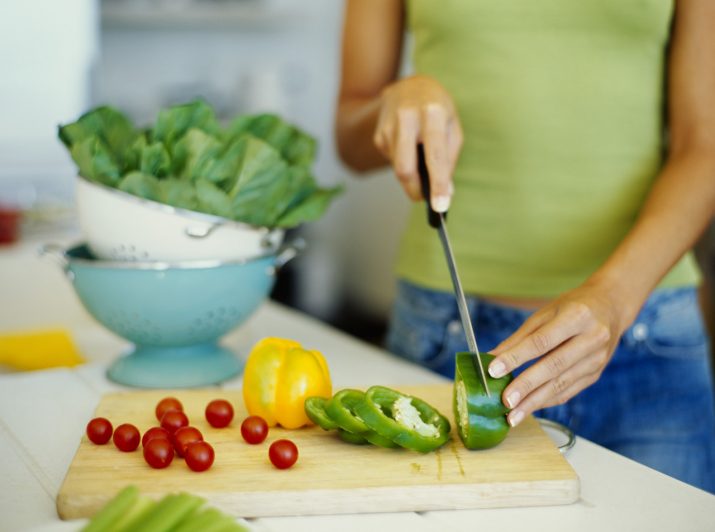How to Find Time to Cook Healthy Meals
By SJW
August 23, 2009 • Fact checked by Dumb Little Man

Real food guru Michael Pollan recently penned an article in The New York Times Magazine about the decline of the art of cooking and the rise of food television. As America spends less time in the kitchen and more in front of the TV, our focus has shifted from active cooking to passive viewing (and eating).
Our health has suffered as a consequence.
Cooking for yourself is arguably the most effective way to achieve and maintain good health. Choosing unprocessed foods over industrial foods also has less impact on the environment and can save you money.
But how can a busy person find the time to cook?
As with most things, fitting cooking into your schedule is a matter of priority and organization. As Pollan points out, you are probably wasting more time surfing the internet and watching TV than preparing your own food.
Here are a few strategies you can use to make sure cooking from scratch is part of your daily (at least weekly) routine:
- Kill your email
While you do not have to be as extreme as Leo Babauta at Zen Habits and eliminate email completely, you can delegate it to a small part of your day by limiting the time you waste re-reading messages and juggling replies. Resolve to spend only 1-2 hours a day or less on email at specific designated times and do not make exceptions. This is difficult to do at first, but can save you dozens of hours a month if you are able to implement it.
- Turn off your TV
A little TV time for relaxing and enjoyment is fine, but if you find yourself spending more than 1 or 2 hours a night staring at a box, it may be time to reevaluate your priorities. Cut your TV time down to only what you really enjoy—and be picky.
- Spend time shopping
Some of the time you gain by unplugging multimedia should be shuttled directly into food shopping. Let’s face it, if you do not have anything fresh in the house you are probably not going to cook yourself dinner. On the flip side, if you spend money on fresh food you are more likely to cook it. Set aside an hour a week to go grocery shopping and visit a farmers market.
Make this time non-negotiable, if you skip it you are doomed for the week.
- Plan your meals
Not everyone can follow a strict weekly meal plan (I sure can’t), but you should have a good idea of the kind of meals you will be eating for the week before leaving the grocery store. For example, if you find some nice corn at the market, think of the other flavors you’d like to eat with it and buy those ingredients too. Jalepeno? Cilantro? Tomato?
iPhone apps like Epicurious and even old-fashioned pen and paper can be incredibly valuable while planning your meal strategy.
- Cook in advance
For some people cooking dinner every day is not a realistic option. If this is you, learn to think in bulk.
Roast an entire chicken Sunday night and eat off of it for a few days, being creative with your reincarnations. Soup is simple to make and easily scalable to any volume. Whole grains can be made in advance and frozen in individual servings. These can be reheated in 1-2 minutes in the microwave. Ditto for beans and lentils.
When planning your large batches, remember you can cook either complete meals or individual ingredients to be combined in creative ways throughout the week. The main goal is to cut cooking time down on any given night to 30 minutes or less by prepping components of your meal or the whole thing ahead of time. Your imagination (which you can extend to the internet) is your limit for saving time with batched cooking.
- Use slow cookers and pressure cookers
Slow cookers (aka crock pots) work by adding a bunch of ingredients to a pot on low heat and cooking them slowly over many hours until they are ready. This is a simple and effective way to make complete meals in large batches. Set it up right and your meals are magically ready when you get home from work.
Pressure cookers are exactly the opposite. Rather than low heat, pressure cookers use high pressure to increase temperature and rapidly cook foods that normally take hours. That may sound crazy, but once you taste beans from a pressure cooker you will never go back to canned. It can also be used for grains, meat and vegetables.
The idea of a pressure cooker can be scary to kitchen novices, but the actual mechanism is very simple. Once you get used to it your pressure cooker will be one of the best time-saving kitchen tools you own.
- Recruit help
Cooking for two people is much more efficient than cooking for one. Likewise two people buying, prepping, cooking and serving food together can dramatically cut the time it takes to get from the front door to the table.
If nothing else, you should at least convince your dining partners to pitch in and help with clean up!
At the end of the day, it is possible to set up your life so that coming home and whipping something up is the quickest and easiest way to eat. Ordering takeout, waiting in line and going to a restaurant easily take as much time as a quick stir fry if you have everything on hand and ready to go.
Cooking for yourself can also help you avoid the constant worry and confusion over what is healthy and what you should and shouldn’t be eating. Make your own food from real ingredients for the majority of your meals and you are well on your way to a better healthstyle.
 |
Written on 8/23/2009 by Darya Pino. Darya is a scientist, San Francisco foodie and advocate of local, seasonal foods. Get more healthy eating tips at her blog Summer Tomato. Follow her on Twitter @summertomato. | Photo Credit: lu lu |







